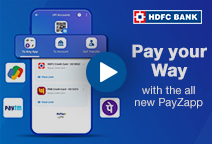You've Been Logged Out
For security reasons, we have logged you out of HDFC Bank NetBanking. We do this when you refresh/move back on the browser on any NetBanking page.
OK- Home
- PAY Cards, Bill Pay
- Money Transfer
- To Other Account
- To Own Account
- UPI (Instant Mobile Money Transfer)
- IMPS (Immediate Payment 24 * 7)
- RTGS (Available 24 * 7)
- NEFT (Available 24 * 7)
- RemitNow Foreign Outward Remittance
- Remittance (International Money Transfers )
- Religious Offering's & Donation
- RemitNow (For Expat)
- Forex Services for students
- Pay your overseas education fees with Flywire
- ESOP Remittances
- Visa CardPay
- Cards
- Bill Payments
- Recharge
- Payment Solutions
- Money Transfer
- SAVE Accounts, Deposits
- INVEST Bonds, Mutual Funds
- BORROW Loans, EMI
- INSURE Cover, Protect
- OFFERS Offers, Discounts
- My Mailbox
- My Profile
- Home
- PAY Cards, Bill Pay
- Money Transfer
- To Other Account
- To Own Account
- UPI (Instant Mobile Money Transfer)
- IMPS (Immediate Payment 24 * 7)
- RTGS (Available 24 * 7)
- NEFT (Available 24 * 7)
- RemitNow Foreign Outward Remittance
- Remittance (International Money Transfers )
- Religious Offering's & Donation
- RemitNow (For Expat)
- Forex Services for students
- Pay your overseas education fees with Flywire
- ESOP Remittances
- Visa CardPay
- Cards
- Bill Payments
- Recharge
- Payment Solutions
- Money Transfer
- SAVE Accounts, Deposits
- INVEST Bonds, Mutual Funds
- BORROW Loans, EMI
- INSURE Cover, Protect
- OFFERS Offers, Discounts
- My Mailbox
- My Profile
- Home
- PAY Cards, Bill Pay

- Money Transfer
- To Other Account
- To Own Account
- UPI (Instant Mobile Money Transfer)
- IMPS (Immediate Payment 24 * 7)
- RTGS (Available 24 * 7)
- NEFT (Available 24 * 7)
- RemitNow Foreign Outward Remittance
- Remittance (International Money Transfers )
- Religious Offering's & Donation
- RemitNow (For Expat)
- Forex Services for students
- Pay your overseas education fees with Flywire
- ESOP Remittances
- Visa CardPay
- SAVE Accounts, Deposits
- INVEST Bonds, Mutual Funds
- BORROW Loans, EMI
- INSURE Cover, Protect
- OFFERS Offers, Discounts
- My Mailbox
- My Profile
- Personal
- Resources
- Learning Centre
- ThisPageDoesNotCntainIconPay
- What Happens If EMI Is Not Paid On Time
What Happens If EMI Is Not Paid On Time ?

27 May, 2024
Synopsis
Paying loan EMIs on time is incredibly vital for your financial health.
Non-payment causes lenders to penalise you and results in asset repossession
It also impacts your CIBIL scores and lenders may take legal action.
In a world where almost everything is expensive, loans offer a much-needed respite, allowing you to purchase various products and assets. Indian banks offer Secured Asset Loans and unsecured Personal Loans to help you finance your purchases. Interest is charged on the amount loaned. Flexible repayment terms, including longer repayment tenures and the facility to repay the loan in Equated monthly instalments (EMIs) are also provided. But what happens if EMI is not paid on time? Will that affect your credit score? In this article, we will address the potential challenges your may face if your loans are not paid on time. We will also show you just how easily you can pay your EMIs via HDFC Bank’s PayZapp app.
What Happens If EMI Is Not Paid on Time?
Taking on a loan is a major financial responsibility, and one must ensure to have the ability to repay it. Not being able to do so, can result in serious consequences. Broadly, the repercussions of not paying EMIs on time are the same but may slightly vary based on whether you’ve taken an unsecured Personal Loan or a Secured Asset Loan. Let’s f look at the general consequences of not repaying loan EMIs.
Impacts your Credit Score
You consistently need a good credit score to show lenders that you are financially reliable. Non-repayment of loan EMIs reduces your credit score, which in turn makes lenders think that you are not creditworthy. It also impacts your ability to obtain more financing or loans in future.
Additional Interest and Penalties
Delayed EMI payments often result in lenders levying additional interest, thus increasing the overall cost of your loan. The interest keeps compounding with every delayed or unpaid EMI. Additionally, lenders may levy EMI late payment charges or penalties, thus enhancing your financial strain.
Results in Legal Action
If you default on repaying your EMIs, your lender may take legal action. This, in turn, may result in certain proceedings/actions through which the court imposes measures to recoup the lender’s investment by involving your employer, i.e., ordering direct payment to the lender from your wages.
Impacts Your (Financial) Health
Yet another repercussion of missing your EMI payments is that it can cause you to fall into a debt trap. Every missed EMI result in added interest expenses. Besides affecting your financial well-being, the stress of having to repay the loan can affect your mental and physical health.
What Happens if Personal Loan EMI is Not Paid?
The consequences of not repaying an unsecured loan, such as a Personal Loan are the same as those listed above. Since the lender does not ask for collateral, they may levy considerably high penalties for every missed EMI.
So, if you are wondering, “what happens if one EMI is not paid”, then you should know that your lender may charge 1%-2% higher interest for every missed EMI. Plus, they may list you as a defaulter and ban you from borrowing money in future.
What Happens if Home/Vehicle Loan EMI is Not Paid?
If you fail to pay the EMIs associated with secured loans like Home or Vehicle loans, you again stand to face the general consequences and penalties, increased interest rates, etc. Moreover, the lender can seize your assets financed through the loan and auction/sell them off to recover their investment.
How the Avoid the Consequences Associated with Defaulting on Loan EMIs?
If you foresee that you may struggle with repaying your loan EMIs, you can take the following actions to avoid the consequences:
Speak to your lender and discuss the options to reduce the EMI by increasing the tenure.
Consider taking a top-up loan to manage your finances, provided you’ve not defaulted on EMI payments already.
Plan your finances efficiently at the time of taking the loan, e.g., choose higher tenures for affordable EMIs.
Consider paying off extra EMIs whenever possible, like when you receive your annual bonus or variable payments.
Paying Loan EMIs Effortlessly on PayZapp
Missing EMIs can be painful, and may have consequences in the long-term. With Payzapp from HDFC Bank, you can make the payment almost instantly. Here are the steps you need to follow to make timely EMI payments via Payzapp:
Log in to the pre-downloaded PayZapp Payment App on your smartphone.
Click on ‘Bills and Recharges’, go to ‘Financial Services’ and select ‘Loan’.
Choose your lender’s name from the drop-down menu, input your loan account number, and wait until PayZapp pulls up your loan account and payable EMI amount.
Choose your preferred payment option from the available methods.
Complete the payment and get an SMS alert from your lender stating that your EMI is paid.
That’s it! With these five easy steps, you will have paid off your loan EMI effortlessly and you can avoid the consequences of non-payment.
Click here to make upi payment through PayZapp on your IOS phone.
Click here to download PayZapp UPI App on your Android phone.
Download PayZapp today to ensure you never miss repaying your loan EMIs.
*Disclaimer: Terms and conditions apply. The information provided in this article is generic in nature and for informational purposes only. It is not a substitute for specific advice in your own circumstances.




